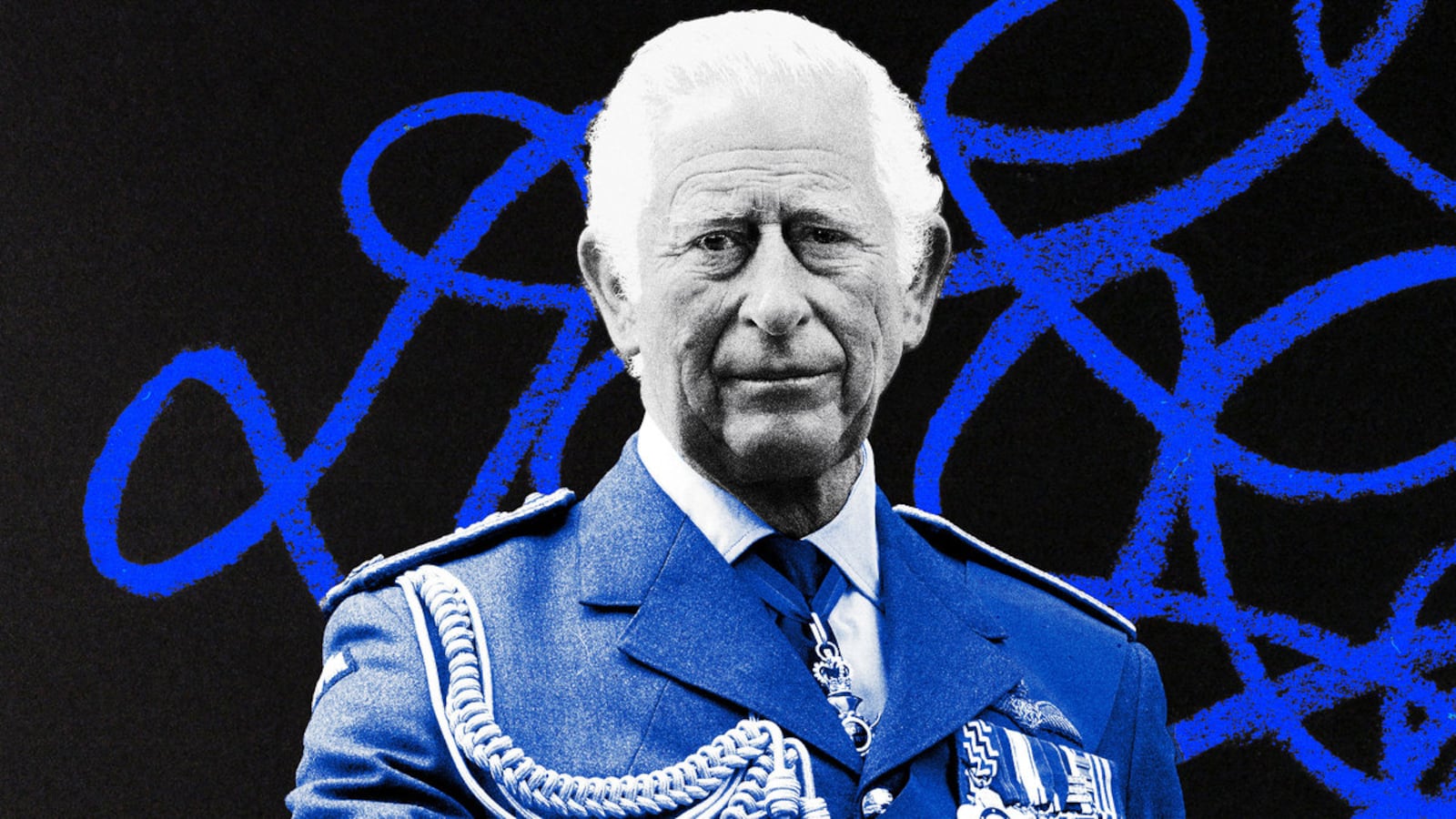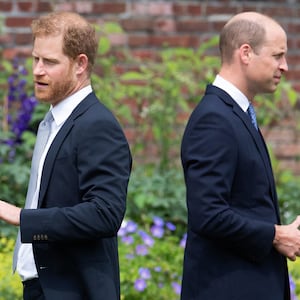Royalist is The Daily Beast’s newsletter for all things royal and Royal Family. Subscribe here to get it in your inbox every Sunday.
There is a gaping vacancy at the top of the House of Windsor. This lack of leadership has become brutally clear as the embattled monarchy faces the imminent detonation of Netflix documentary Harry & Meghan, and the still-swirling controversy of Lady Susan Hussey’s interrogation of Black British charity boss Ngozi Fulani at a Buckingham Palace reception last week.
The fallout from the latter derailed Prince William and Kate Middleton’s trip to Boston, and again shone an unforgiving light on racism within the royal household—last week it was William, not Charles’ condemnation of racism that led news broadcasts.
Harry and Meghan outlined their experience of royal racial prejudice in their 2021 Oprah Winfrey interview. On Tuesday they received an award in New York for their confronting of it; and on Thursday, when the first batch of episodes of Harry & Meghan are released, they may well return to it. What they will say about it, and indeed anything else, nobody knows.
Royal sources, as The Daily Beast has reported, have been viciously trashing Harry and Meghan in the run-up to transmission, while also claiming to be “weary” of what they might say. Prince William’s team will reportedly be monitoring the show in case pushback is necessary. The vibe is blithe business-as-usual, while actually devoting much time to countering and denigrating the Sussexes.
So far all the backbiting has centered around the two trailers released by Netflix. The latest showed clips of his mother, Princess Diana, being chased by paparazzi, as Harry says: “I was terrified. I didn’t want history to repeat itself.” Meghan says, over footage of her wiping tears from her eyes: “I realized, they’re never going to protect you.” The trailers have been criticized for featuring footage not of the actual couple, but their overall theme seems to be that much grievance will be shared.
The question now is, will any damaging new claims or allegations be made against the royals or specific members of the family—and what, if any, lead will King Charles take in the royal response?
Whatever Harry and Meghan do say, the news cycle of the last few days shows how far relations within the family have fallen—and Charles’ apparent lack of engagement with it. Without the presiding presence of Queen Elizabeth II there is a sense that the long-running family feud is out of control and descending into a tone of unremitting coarseness and vulgarity. Whatever the crisis, the queen was always above the rancor. Her composure conveyed stability and neutrality.
Charles, in contrast, cannot be neutral in this conflict. He is at the heart of the crisis, as both a parent and the man who has to prove his authority as chief executive of “the Firm.” He is open to attack for his performance so far on both counts.
The challenge of leadership is not confined to Harry and Meghan’s onslaught. Their accusations of endemic racism in the Palace have been given new force by the dismissal of Lady Hussey as a lady-in-waiting, after her behavior toward Fulani at a Palace reception given by Queen Consort Camilla.
The king has yet to respond personally. He left William and Kate to field the barrage of questions in Boston. During this first critical test of his leadership his style remains as it was before he came to the throne: leave a mess for others to pick up, as he did with the honors-for-donations scandal at the Prince’s Trust. Does it suit him as king for William to take the heat—famously his son is more popular among the British people than he is, after all.

A still from a trailer of 'Harry & Meghan' on Netflix.
NetflixBut what about Harry? In his first speech as king, Charles made sure to mention his son and Meghan by name, but since then, as the Netflix documentary and imminent publication of Harry’s memoir shows, father and son have never appeared so far apart. If Harry attacks Charles in either of the upcoming projects, it will be yet more hammer blows to their relationship, personally and publicly.
The queen, herself never once monstered by the tabloids (the closest was the intense and deserved criticism she received in the days after Diana’s death), maintained a glacial purity of motive however nasty the clashes below her became—and for a while now the warfare between the Palace and the Sussexes has been characterized by a level of mutual hostility unusual in any family.
In the second clip from the Netflix documentary Harry called the collusion between the Palace and the media wolf pack a “dirty game,” and we have just seen what he means with two cheap shots aimed at the documentary.
When Netflix dropped the first trailer, members of William and Kate’s entourage and other Palace briefers compared Meghan and Harry’s performative style with that of the Kardashians. Given the vacuity and cupidity of the Kardashians (plus a marriage involving a rabid antisemite) this was an unconscionable slur.
There was also a charge that the Sussexes caused distress to the queen while knowing she was terminally ill with bone cancer—a particularly cheap shot since Harry has always revered his grandmother and it was nonsense anyway because the queen was far more anguished about the sins and excommunication of Andrew.
For the longer-term prospects of the monarchy under Charles the most damaging problem here is basically cultural. The conflict between the Palace and the Sussexes is being voiced in the same partisan terms and being played by the same ruthless rules that are now commonplace in the politics of Washington and Westminster. There is no middle ground. You have to take sides.
But the personalities and the issues involved defy such a simple allocation of allegiance. On the one hand, the Sussexes are clearly driven by a strong and unabating sense of victimhood. Their villains are both individuals and the institution of the monarchy itself. Their interview with Oprah outlined the narrative but did not convincingly document it—that is why the Netflix documentary is so demanding of them and so challenging for the Palace.
For their part, the royal family—principally Charles, Camilla, William and Kate—have never given a convincing definition of the nature of the threat that the Sussexes supposedly pose to them and the monarchy. Indeed, their every complaint about the Sussexes’ behavior, either open or covert, is about their own pain, and never about the pain and distress of Harry and Meghan.

Britain's Prince Harry, Duke of Sussex (L) and Britain's Meghan, Duchess of Sussex (2nd R) follow Britain's Prince William, Duke of Cambridge (C) and Britain's Catherine, Duchess of Cambridge (R) as they depart Westminster Abbey after attending the annual Commonwealth Service in London on March 9, 2020.
Phil Harris/AFP via Getty ImagesThe six-part documentary intends to detail that pain as a correction to the record. In the second trailer Harry said, “No one knows the full truth. We know the full truth.” However, that forensic purpose comes enrobed in the form of a love story, tracing their six-year relationship in an intimate, soul-bearing script that includes appearances by Princess Diana, the witness who never leaves the stage and never relents. And that reminds us of the king’s own demons and how they must persist as his sons dispute the validity and extent of the emotional damage he bequeathed as a parent.
It doesn’t help that most people get this drama fed to them in the daily demotic of a tabloid front page, always reduced to the level of a potboiler that just keeps reinforcing the entrenched biases of each side.
In the bald terms of warfare and the resources of each side, this seems on the face of it like asymmetrical combat. The royal firm is a multi-million dollar machine able to deploy, like a corporation ruthlessly protecting its brand, extensive and often unprincipled methods against whistleblowers. They have—as Harry outlined to Oprah—assiduously cultivated sections of the British press to carry out media black ops against the Sussexes, including planted stories and hostile briefings. (The most neutral and effective coverage of the monarchy has been by the BBC, whose coverage of the queen’s death was impeccable, while their Andrew interview essentially finished him off and their detailed accounting of Lady Hussey’s interrogation of Fulani was essential viewing.)
On the other hand, Netflix is surely a force multiplier for Meghan and Harry. Their deal with the streamer is reckoned, over a period, to be worth as much as $100m, although little of it was upfront and its true value will ultimately rest on performance. In fact, it looks like being a great deal for Netflix. They can spend as much as $200m on a tentpole movie like Red Notice, while the Meghan and Harry documentary will probably be worth much more to them in generating a huge windfall in audience and publicity.
The Windsors haven’t faced a moment like this since the death of Diana, when the queen made one of her rare misreadings of public opinion and, for a while, paid dearly for it in esteem. Charles was relatively old by the time he faced the loss of both parents. He spent most of his adulthood deferring to their judgment (and, on occasion, being found wanting by them).
He’s on his own now, although he may still feel under observation from a celestial throne. Philip, in a moment of exasperation as Charles’ marriage to Diana was failing, said that Charles was not king material. If he is to prove that wrong he will surely need to understand that he can’t lead from behind. That seemed to be his natural instinct while he was the heir, but it doesn’t work for him now. Nobody knows him better than Camilla, and she can’t be happy that he’s not been more forceful and upfront about racism in the royal household.
It’s also hard to gauge his true feelings about his second son, whose choice of title for his memoir, Spare, speaks volumes about the distance he feels from his father. Is there a ruthlessness there in Charles’s priorities—or just another symptom of an inability to face up to and solve failures of affection? At the very least, if his reign is to endure, the family feud needs to end and that can only happen if the discourse is conducted with civility and decency, something the queen would have expected.







